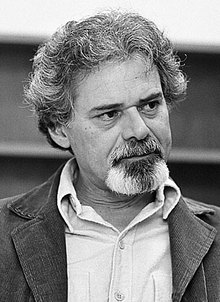Gilbert Sorrentino
Gilbert Sorrentino | |
|---|---|
 | |
| Born | April 27, 1929 Brooklyn, New York |
| Died | May 18, 2006 (aged 77) |
| Occupation | Novelist, writer, critic, professor |
| Genre | Fiction |
Gilbert Sorrentino (April 27, 1929 – May 18, 2006) was an American novelist, short story writer, poet, literary critic, professor, and editor.[1]
In over twenty-five works of fiction and poetry, Sorrentino explored the comic and formal possibilities of language and literature. His insistence on the primacy of language and his forays into metafiction mark him as a postmodernist, but he is also known for his ear for American speech and his attention to the particularities of place, especially of his native Brooklyn.
Life
Sorrentino was born in Brooklyn, New York in 1929. He grew up in the borough's Bay Ridge neighborhood and attended Brooklyn College before and after serving in the United States Army Medical Corps during the Korean War. In 1956, Sorrentino founded the literary magazine Neon with friends from Brooklyn College, including childhood friend Hubert Selby Jr. He edited Neon from 1956 to 1960, then served as editor for Kulchur from 1961 to 1963. After working closely with Selby on the manuscript of Last Exit to Brooklyn (1964), Sorrentino was an editor at Grove Press from 1965 to 1970, where one of his editorial projects was The Autobiography of Malcolm X.
He eventually took up positions at Sarah Lawrence College, Columbia University, the University of Scranton and the New School for Social Research in New York before being hired as a professor of English at Stanford University, where he served from 1982 to 1999. Although Sorrentino never finished his degree, the head of Stanford's writing program opined that "Sorrentino is a very learned man – we weren't for a second concerned about a Good Housekeeping seal of approval." Following his retirement from Stanford, Sorrentino returned to Bay Ridge, where he lived for the remainder of his life.
His students included the novelists Jeffrey Eugenides, Trey Ellis and Nicole Krauss. His son, Christopher Sorrentino, is the author of the novels Sound on Sound and Trance.
Writing
Sorrentino's first novel, The Sky Changes, was published in 1966. Notable among his many other novels are Imaginative Qualities of Actual Things, Blue Pastoral, and Mulligan Stew. The latter novel, a humorous postmodern romp, riffs on the metafictional possibilities introduced in Flann O'Brien's novel At Swim-Two-Birds, and is one of Sorrentino's most popular works.
His 1999 novel, Gold Fools, is written entirely in interrogative sentences not, as critic Steven Moore says, "just to see if he could pull it off, but because he wanted to interrogate our cultural assumptions about the Old West."[2]
In 2010 a posthumous novel, The Abyss of Human Illusion, was published by Coffee House Press with a preface by Christopher Sorrentino.
Honors and awards
Sorrentino was the recipient of numerous awards and honors, including Guggenheim Fellowships in Fiction in 1973 and 1987, the John Dos Passos Prize for Literature (1981), PEN/Faulkner Award finalist in 1981 and 2003, the Mildred and Harold Strauss Livings of the American Academy of Arts and Letters (declined, 1982), the American Academy of Arts and Letters Award for Literature (1985), the Lannan Literary Award for Fiction (1992), and the Lannan Lifetime Achievement Award in 2005. He died in Brooklyn on May 18, 2006.
Bibliography
Fiction
- The Sky Changes (1966)
- Steelwork (1970)
- Imaginative Qualities of Actual Things (1971)
- Splendide-Hôtel (1973)
- Flawless Play Restored: The Masque of Fungo (1974)
- Mulligan Stew (1979)
- Aberration of Starlight (1980)
- Crystal Vision (1981)
- Blue Pastoral (1983)
- Odd Number (1985)
- Rose Theatre (1987)
- Misterioso (1989)
- Under the Shadow (1991)
- Red the Fiend (1995)
- Gold Fools (1999)
- Little Casino (2002)
- The Moon in its Flight (short fiction, 2004)
- Lunar Follies (2005)
- A Strange Commonplace (2006)
- The Abyss of Human Illusion (2010)
Novella
- A Beehive Arranged on Humane Principles (1986)
Poetry
- The Darkness Surrounds Us (1960)
- Black and White (1964)
- The Perfect Fiction (1968)
- Corrosive Sublimate (1971)
- A Dozen Oranges (1976)
- White Sail (1977)
- Sulpiciae Elegidia: Elegiacs of Sulpicia (1977) (Translator)
- The Orangery (1978)
- Selected Poems 1958–1980 (1981)
- New and Selected Poems 1958–1998 (2004)
Criticism
- Something Said (1984)
References
- ^ Ramirez, Anthony (May 22, 2006). "Gilbert Sorrentino, Novelist and professor, Dies at 77". The New York Times.
- ^ "Interview with critic and author Steven Moore". Porter Square Books Blog. June 9, 2010. Retrieved August 23, 2013.
External links
- 1929 births
- 2006 deaths
- 20th-century American novelists
- 21st-century American novelists
- American male novelists
- American writers of Italian descent
- Beat Generation writers
- Writers from Brooklyn
- Stanford University Department of English faculty
- Sarah Lawrence College faculty
- Columbia University faculty
- University of Scranton faculty
- Guggenheim Fellows
- Poets from New York
- 20th-century American poets
- 21st-century American poets
- American male poets
